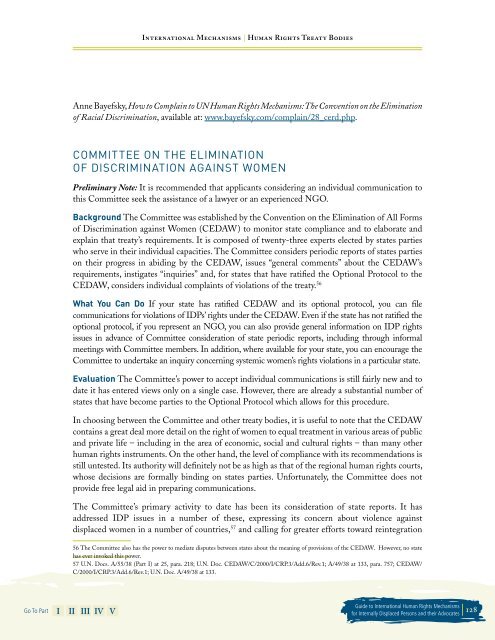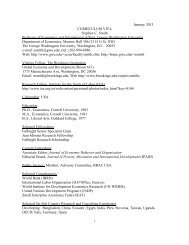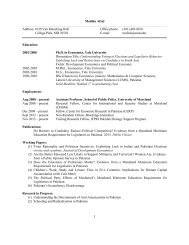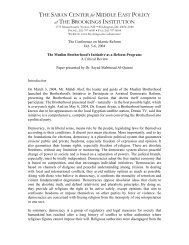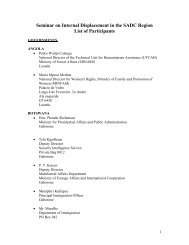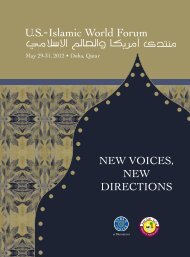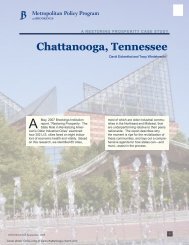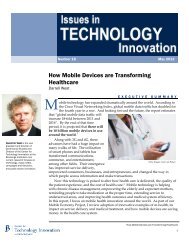Guide to International Human Rights Mechanisms - Brookings
Guide to International Human Rights Mechanisms - Brookings
Guide to International Human Rights Mechanisms - Brookings
You also want an ePaper? Increase the reach of your titles
YUMPU automatically turns print PDFs into web optimized ePapers that Google loves.
Go To Part I II III IV V<br />
<strong>International</strong> <strong>Mechanisms</strong> | <strong>Human</strong> <strong>Rights</strong> Treaty Bodies<br />
Anne Bayefsky, How <strong>to</strong> Complain <strong>to</strong> UN <strong>Human</strong> <strong>Rights</strong> <strong>Mechanisms</strong>: The Convention on the Elimination<br />
of Racial Discrimination, available at: www.bayefsky.com/complain/28_cerd.php.<br />
COMMITTEE.ON.THE.ELIMINATION..<br />
OF.DISCRIMINATION.AGAINST.WOMEN<br />
Preliminary Note: It is recommended that applicants considering an individual communication <strong>to</strong><br />
this Committee seek the assistance of a lawyer or an experienced NGO.<br />
Background The Committee was established by the Convention on the Elimination of All Forms<br />
of Discrimination against Women (CEDAW) <strong>to</strong> moni<strong>to</strong>r state compliance and <strong>to</strong> elaborate and<br />
explain that treaty’s requirements. It is composed of twenty-three experts elected by states parties<br />
who serve in their individual capacities. The Committee considers periodic reports of states parties<br />
on their progress in abiding by the CEDAW, issues “general comments” about the CEDAW’s<br />
requirements, instigates “inquiries” and, for states that have ratified the Optional Pro<strong>to</strong>col <strong>to</strong> the<br />
CEDAW, considers individual complaints of violations of the treaty. 56<br />
What you can Do If your state has ratified CEDAW and its optional pro<strong>to</strong>col, you can file<br />
communications for violations of IDPs’ rights under the CEDAW. Even if the state has not ratified the<br />
optional pro<strong>to</strong>col, if you represent an NGO, you can also provide general information on IDP rights<br />
issues in advance of Committee consideration of state periodic reports, including through informal<br />
meetings with Committee members. In addition, where available for your state, you can encourage the<br />
Committee <strong>to</strong> undertake an inquiry concerning systemic women’s rights violations in a particular state.<br />
evaluation The Committee’s power <strong>to</strong> accept individual communications is still fairly new and <strong>to</strong><br />
date it has entered views only on a single case. However, there are already a substantial number of<br />
states that have become parties <strong>to</strong> the Optional Pro<strong>to</strong>col which allows for this procedure.<br />
In choosing between the Committee and other treaty bodies, it is useful <strong>to</strong> note that the CEDAW<br />
contains a great deal more detail on the right of women <strong>to</strong> equal treatment in various areas of public<br />
and private life – including in the area of economic, social and cultural rights – than many other<br />
human rights instruments. On the other hand, the level of compliance with its recommendations is<br />
still untested. Its authority will definitely not be as high as that of the regional human rights courts,<br />
whose decisions are formally binding on states parties. Unfortunately, the Committee does not<br />
provide free legal aid in preparing communications.<br />
The Committee’s primary activity <strong>to</strong> date has been its consideration of state reports. It has<br />
addressed IDP issues in a number of these, expressing its concern about violence against<br />
displaced women in a number of countries, 57 and calling for greater efforts <strong>to</strong>ward reintegration<br />
56 The Committee also has the power <strong>to</strong> mediate disputes between states about the meaning of provisions of the CEDAW. However, no state<br />
has ever invoked this power.<br />
57 U.N. Docs. A/55/38 (Part I) at 25, para. 218; U.N. Doc. CEDAW/C/2000/I/CRP.3/Add.6/Rev.1; A/49/38 at 133, para. 757; CEDAW/<br />
C/2000/I/CRP.3/Add.6/Rev.1; U.N. Doc. A/49/38 at 133.<br />
<strong>Guide</strong> <strong>to</strong> <strong>International</strong> <strong>Human</strong> <strong>Rights</strong> <strong>Mechanisms</strong><br />
for Internally Displaced Persons and their Advocates 128


